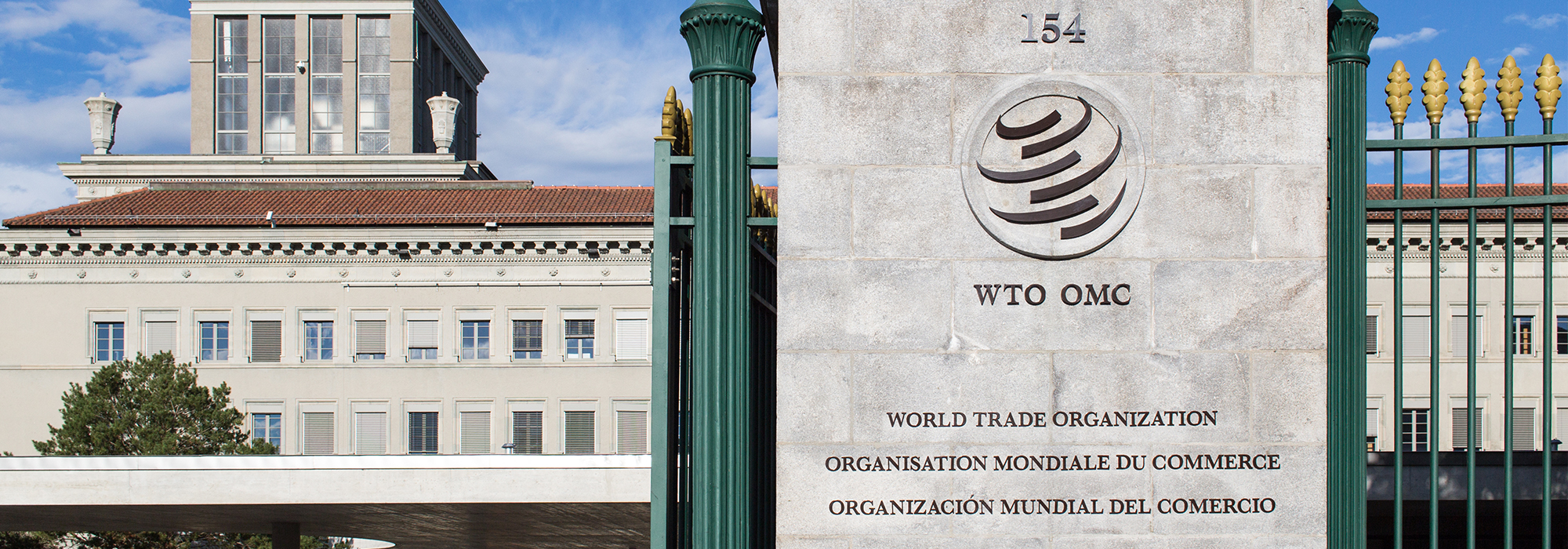
With the prospect of the global order collapsing amid protectionist acrimony, what can Canada do? In her June 2017 speech on Canada’s foreign policy priorities, Minister Chrystia Freeland stressed that Canada’s first priority is to “robustly support the rules-based international order, and all its institutions,” which explicitly included strengthening the World Trade Organization (WTO). Much of the necessary work is not glamorous, but Canada is well-positioned to play a constructive role.
The US is pivoting towards unilateral protectionism based on a misplaced preoccupation with bilateral deficits in goods. An American decision to impose trade restraints on spurious national security grounds is a potential catastrophe, if it emboldens other countries to do the same. The risk is that the WTO will falter in this dark age for multilateralism. Keeping the lights on in the WTO is essential to ensure that it plays its vital role in the operation of the trading system and that its negotiating function is there when the principal players are ready for it again.
The multilateral trading system should be the foundation of Canadian trade policy, because it provides the overall framework for Canada’s trade with the world — including with its NAFTA partners, but also with the fast-growing large emerging economies, whose tariff and non-tariff barriers are higher than those of our traditional partners in slow-growing rich countries. All significant traders are members of the WTO, and its rules cover goods, services and intellectual property, as well as other topics for which no alternative negotiating forum exists, such as subsidies. Preferential trade agreements being negotiated outside of the WTO are not likely to result in a coherent global trading system because systemically important traders are often omitted (such as China) and inconsistencies between agreements (such as for privacy rules in e-commerce chapters of agreements) can be confusing for firms operating in multiple markets.
The WTO’s main principles and strengths — inclusiveness, nondiscrimination, reciprocity, transparency, and neutral and effective dispute settlement — have served Canada and the rest of the world well.
The WTO’s main principles and strengths — inclusiveness, nondiscrimination, reciprocity, transparency, and neutral and effective dispute settlement — have served Canada and the rest of the world well. Although the WTO’s negotiating function remains sclerotic for now, its underlying institutional apparatus is healthy, and the effectiveness of many aspects of preferential trade agreements negotiated outside of the WTO, ultimately depends on the WTO’s robust transparency and accountability mechanisms. Its dispute settlement system is more effective than anything tried in preferential trade agreements so far, not least because no preferential agreement has anything like the WTO’s neutral and effective secretariat.
Policy-makers need to consider both existing trade patterns and potential trading opportunities, but detailed forecasts of the shape of the world economy in 10 or 20 years are bound to be unreliable. The WTO is therefore Canada’s best hedge against unavoidable uncertainty — part of a future-proof trade strategy that allows Canada to take advantage of growth wherever it occurs. The WTO will wither, however, if dueling preferential deals come to define the universe of trade agreements.
Canada thus should work with like-minded partners to foster an eventual return to a more inclusive, cohesive and multilateral global trading system. Indeed, the current absence of multilateral leadership is an opportunity for Canada to convene small groups of countries to chart the future course of the trading system — including by using its analytical resources to craft informal policy papers to focus discussion on emerging issues. This traditional role for Canadian leadership is needed now more than ever.
And the challenge is immediate: the WTO could be badly hurt by a collapse of its biennial ministerial in Buenos Aires this December. A sign of this sad time for multilateralism was the G20 meeting in Hamburg this year, where leaders renewed their support for the WTO and the multilateral trading system, but the language was more lukewarm than in past years. U.S. Trade Representative Robert Lighthizer told the Senate Finance Committee in June, according to Inside US Trade, that the U.S. is not looking for « major deliverables or significant negotiated outcomes » at Buenos Aires, where expectations were already low. American trade policy apparatus remains under-staffed and preoccupied by trying to deliver on the dramatic actions promised by President Trump, including renegotiating NAFTA.
Four things Canada can do
Whatever the US hesitations about multilateralism are at the moment, it is essential to keep the Americans in the system and keep the lights on at the WTO. WTO members need to be able to declare success at Buenos Aires, and they need to find ways to improve the WTO, to maintain some forward movement. There are four key things Canada can do.
First, Lighthizer told the Senate committee that he wants “meaningful changes” to the WTO dispute settlement system. Such changes, however, would only be part of a conclusion to the long-running dispute settlement negotiations — which would ironically require the sort of negotiated outcome that he says he doesn’t want at Buenos Aires.
Other actions related to enforcement could be taken now, however, like improving the transparency system. Three actions are especially important for the operation of transparency in the WTO: how the other Members of the WTO are notified of a new policy action; how such a notification is discussed in the relevant WTO committee in Geneva; and whether the results of the Geneva process are published in a way that allows citizens to hold their government accountable. The secretariat is also charged with using such information to monitor the impact of policy changes on the trading system as a whole. Without a robust notification and committee process, there will be more conflict, more disputes, and less credibility for the system.
Canada should lead an effort to gain consensus for an expanded role for secretariat data collection and analysis that could fill the gap left by inadequate notification by members, beginning with a substantial financial commitment to a new trust fund to support such activities. Such funding would allow the WTO secretariat to act as the common agent of members in assembling information on the trade policies of WTO members. These functions have been undermined by the reallocation of resources to hire more lawyers to support the dispute settlement system. Smaller countries similar to Canada likely to support such an effort include Norway, Switzerland, Australia, New Zealand, and Indonesia, but big countries also support better transparency, including the European Union and Japan. China might be supportive. And, at least at the level of officials, so might the United States.
Second, the WTO needs a process for bundling disparate issues into a single package that could attract broad support at Buenos Aires. Canada should play a leadership role, notably at a meeting of a small group of ministers planned for October in Morocco, to find common ground on a package that might include modest progress on the negotiations on fisheries subsidies (where Canada is leading a small group outside WTO on this issue) and domestic support for farmers.
Third, without abandoning the issues on the Doha Round agenda, the WTO needs to develop a future work program that might envisage more use of so-called plurilaterals (agreements negotiated among a subset of members but linked to the WTO framework) on such topics as rules of origin (a major issue for global value chains), regulatory and standards-setting cooperation, and state-owned enterprises. Canada should continue its efforts to encourage voluntary improvements to the dispute settlement system. The future agenda would also include potential WTO action on the UN Sustainable Development Goals as a way to address many of the public’s concerns about trade – embracing what our IRPP research volume calls an “inclusive trade agenda.”
Finally, Ottawa should send a strong replacement for Jonathan Fried at the WTO, who was our most recent in a long series of distinguished Canadian ambassadors in Geneva, supported by excellent staff. A strong team in Geneva is especially important when trade policy officials in Ottawa are distracted by a heavy agenda, including the NAFTA renegotiation. Canadians have always had a trade policy bureaucracy appropriate to a rich small open economy. Canada has the resources to back up creativity with robust analysis and contacts with a wide group of countries. Canada can still play that role.
The trading system must adapt to seismic changes in what is traded and by whom, but the WTO is stuck, as are most other multilateral negotiations, in a world without global leadership. Canada has influence at the WTO not because of its size or wealth, but because of how it uses its advantages to be helpful. Now is the time to help articulate the next agenda. That is what will give Canada a seat at the table when the major players are ready to talk again. The Freeland doctrine requires nothing less.
This article is part of the Trade Policy for Uncertain Times special feature.
Photo: Shutterstock/Martin Good
Do you have something to say about the article you just read? Be part of the Policy Options discussion, and send in your own submission. Here is a link on how to do it. | Souhaitez-vous réagir à cet article ? Joignez-vous aux débats d’Options politiques et soumettez-nous votre texte en suivant ces directives.






